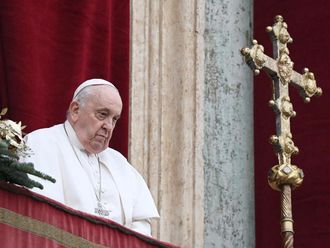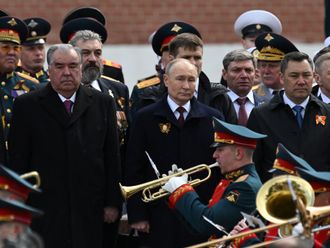SKOPJE: Macedonia’s opposition called on conservatives Friday to accept a peaceful transfer of power, as a refusal to allow them to form a government has plunged the Balkan nation deeper into political crisis.
Though opposition leader Zoran Zaev of the Social Democrats (SDSM) has won the backing of a parliamentary majority, Macedonia’s president has refused to grant him a government-building mandate.
The impasse has left the country unable to exit from a long-running crisis that was supposed to be solved by an EU-brokered deal that included an election in December.
“VMRO-DPMNE (conservative party) leadership should immediately stop manipulating people into protesting, stop provoking ... violence and enable a peaceful transfer of power,” an SDSM statement said.
The inconclusive December vote saw the VMRO-DPMNE party secure 51 seats in the 120-seat parliament — or two more than the Social Democrats — but the conservatives failed to reach a deal with ethnic Albanian parties, who have a kingmaker role.
Zaev went on to win the support of the Albanian parties, giving him 67 deputies in the assembly and clearing the way for him to form a government.
However, President Gjorge Ivanov, who is close to VMRO-DPMNE, said earlier this month that he would not give a mandate to anyone supporting “a platform undermining Macedonia’s sovereignty, territorial integrity and independence”.
He was referring to the controversial demand of minority ethnic Albanian parties, who have backed Zaev, that Albanian be made an official language across Macedonia.
Ethnic Albanians make up around one quarter of the country’s 2.1 million inhabitants.
Ivanov’s move was swiftly denounced by the opposition as a “coup” and condemned by the United States and the European Union, which Macedonia aspires to join.
But thousands of Macedonians agree with the president and for the past three weeks have taken to the streets, chanting patriotic slogans and urging unity.
Their main objection is to the demand to make Albanian an official language in Macedonia.
Albania’s President Bujar Nishani on Thursday warned Macedonia, saying “that attempts to turn the political crisis into an ethnic crisis could have serious consequences for everyone”.
Macedonia has been mired in deep political upheaval for the past two years sparked by a wiretapping scandal.
The former Yugoslav republic aspires to join both Nato and the EU.
However, its membership has been blocked by Athens over a dispute about the country’s name — a northern region of Greece is also called Macedonia.












